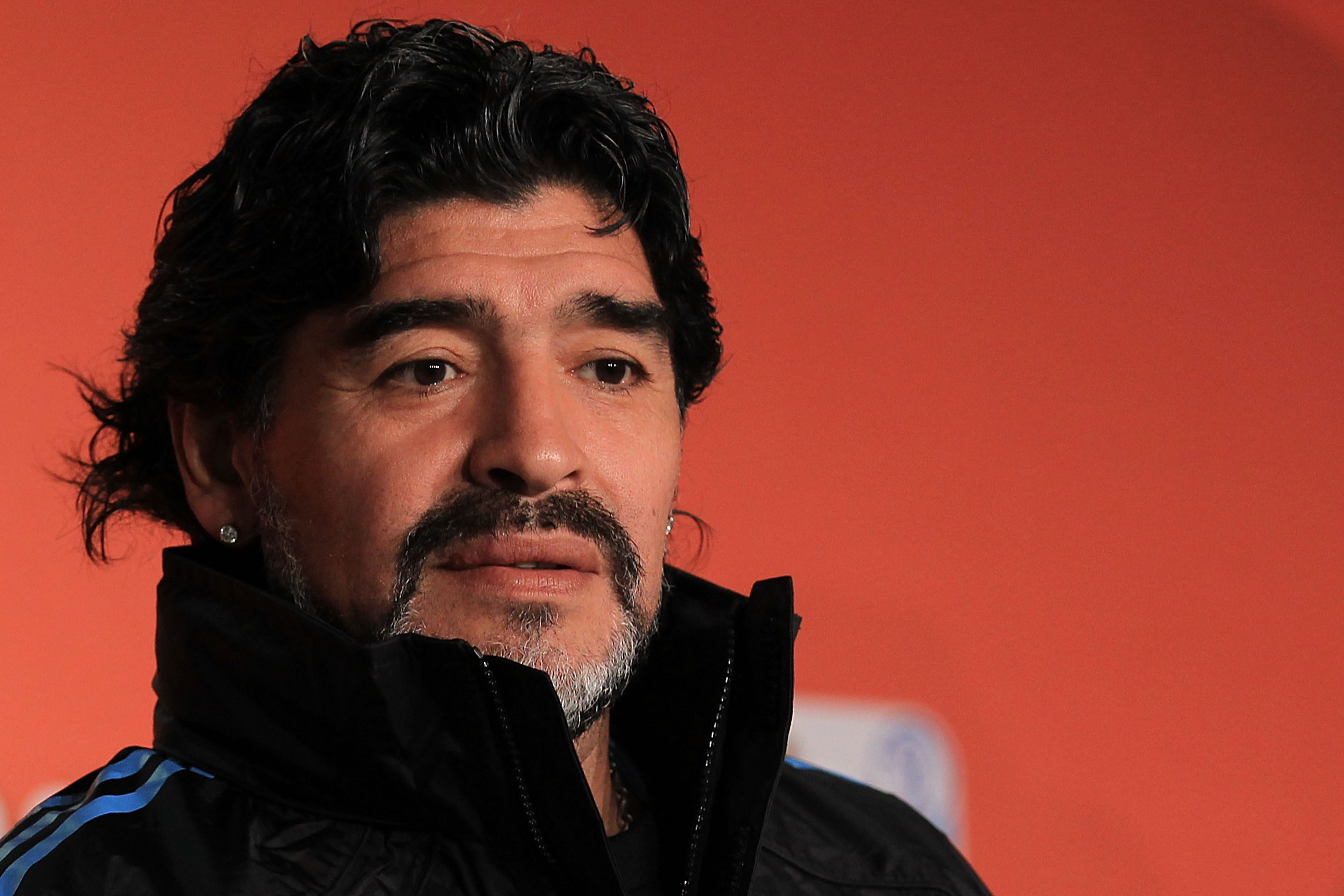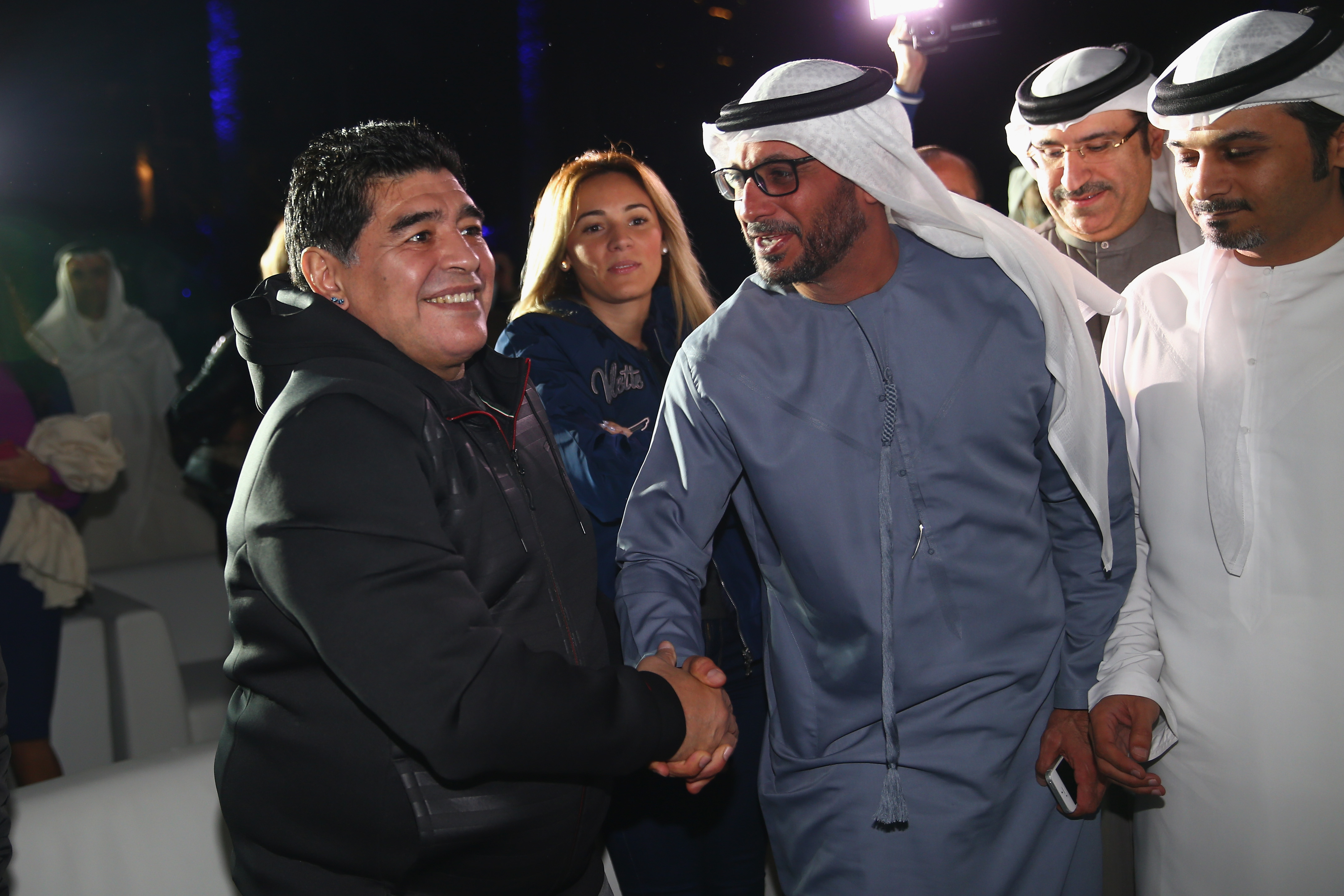“I came all the way from Argentina,” begged Diego Peres. He kneeled and again implored his personal diety. “And I came from Argentina, too,” retorted Diego Maradona. His bodyguard moved in and whispered something into his ear. Maradona shrugged, then hesitated, but ultimately allowed Peres a photo opportunity.
***
On the first Sunday of August, a black limo shuttled Diego Maradona from Dusseldorf, Germany to Mierlo, a sleepy village encircled by forests, moorlands, and meadows near Eindhoven, the Netherlands’ fifth largest city. Al-Fujairah’s new coach had picked the location because of the training facilities at the Carlton De Brug Hotel: it had five full-size playing fields right outside its lobby. European clubs of higher esteem, such as Rosenborg, Fenerbahçe and Malaga, had all been to Mierlo before.
Maradona enjoyed himself in Mierlo. He tried to buy pajamas at HEMA–a Dutch discount retail store–with a €500 note, visited a local landmark–a mill, of course–and attended a PSV Eindhoven game. At Fujairah practice, he got a chance to observe his squad in earnest for the first time. He even flaunted his own skills with a neat free-kick, a perfect teaser in the social media age.
The news of Maradona’s sojourn in the province spread. First, it was a trickle, then a stream: from every nook of Europe, an army of Diego devotes marched on North Brabant. They slogged their way across the old continent, booked cheap hotel rooms, and arrived with twinkling eyes. These fans were neither hipsters nor thrill seekers; what they sought was the existential experience of meeting their icon. This was a congregation of worshippers, who believed that Maradona was the ultimate thespian of the beautiful game. They stood for hours in the rain and slept in cars. They kneeled, cried and wept. In Mierlo, they all wanted to shake the hand of Dios.
“Everyday was slightly crazy,” said Dutch FIFA agent Atalay Mutlu. “Napoli fans traveled for the day to try and grab an autograph. People with Maradona’s face tattooed on their back and arms came here to meet him. There are children whose family name is Diego or Maradona.”
They accompanied Maradona’s every single step. They have done for decades. It was solitude at its cruelest. Maradona hollered; all he wanted to do was quietly sip Heineken and watch Napoli’s Champions League triumph against OGC Nice. The Argentine’s mood swung from the cheerful to the downright agitated, before he retired to his suite with his girlfriend, Rocio Oliva. Hugo Maradona, his younger brother–who enjoyed a modest playing career in Spain, Italy, Austria and Japan–stepped in and posed with the fans, a token consolation. Later on, Maradona even walked out of a meet & greet. Perhaps his enigmatic character, always with an obliging circus in tow, will forever overshadow his coaching career. Maradona remains the maverick from Lanús, volatile and unpredictable. It’s never been any different, not even in his previous coaching spells.

Back in 2008, Maradona was appointed coach of Argentina. He was both a great coach and, as Claudio Gentile put it, a charlatan. He ranted and swore, and, ultimately, his reign self-imploded in the tangled web of murky Argentinean FA politics, spun by soccer autocrat Julio Grondona.
The catalyst was Argentina’s humiliating 4-0 quarter-final elimination against Germany at the 2010 World Cup. The novice coach had picked an unbalanced starting eleven, which favored the counter-attacking Germans, who never looked like relinquishing victory after Miroslav Klose’s early goal. The inexperienced Maradona was found out: his team and tactics were impotent confronted with so much Teutonic excellence.
Exit Maradona. The sequel was a spell with Al-Wasl in the United Arab Emirates, his first foreign coaching venture. For The Cheetahs, acquiring Maradona’s services was a PR coup, injecting the club with a new self-esteem and generating plenty of media attention; the Maradona circus had arrived in the Arabian Gulf. With limited knowledge of the local culture and football heritage, Maradona steered Al Wasl to the final of the GCC Club Cup. They were defeated by Bahrain’s Al-Muharraq. CEO Marwan bin Bayyat resigned and Maradona’s tenure came to an end.

But during his sojourn at Al Wasl, Maradona and Dubai developed a relationship of mutual appreciation. Maradona thrived in an environment where paparazzi are forbidden. The Dubai Sports Authority, the governing body of sports in the Emirate, offered Maradona a consultancy. He duly accepted and made booming Dubai, a dusty jungle of kitsch and decadence, his new home.
Perhaps Maradona’s coaching career has always been a strangely meandering one, a concoction of historical greatness with the ravages of fame and an enduring love for the game. Last May he signed at Al-Fujairah; his new posting in the remote Emirate, a two-hour’s drive from the hustle and bustle of Dubai, is peculiar. Fujairah is a modest club playing in the second tier of the United Arab Emirates soccer scene; in other words, it’s an outpost.
Hilal Saeed, a former UAE international, is Al-Fujairah’s player of standing. Romania’s Mihai Costea, France’s Omar Kossoko and Argentina’s Gonzalo Bravo make up the foreign contingent. Maradona has been tasked to guide the club, backed by local authorities and subsidized by the UAE’s FA, to the top flight. “We are working very hard and we have a clear plan for the club,” said Maradona’s assistant coach Luis Islas. “Diego is an inspiration for everybody.”
During practice in Mierlo, Maradona bonded with his players. He hugged them. He sang and danced with them. His towering persona galvanized those around him. He may neither be a Marcelo Bielsa nor Jorge Sampaoli, but his personal, infectious coaching, whatever the controversy and color, is a virtue that may allow his player to excel and take a moonshot, to start with against Orouba in the first round of the domestic Cup. Whatever happens in Fujairah, Maradona has found the quiet that he’s searched for, and the quiet that his post-playing career couldn’t nail down before now.
Additional reporting by Johnny Georgopoulos.







